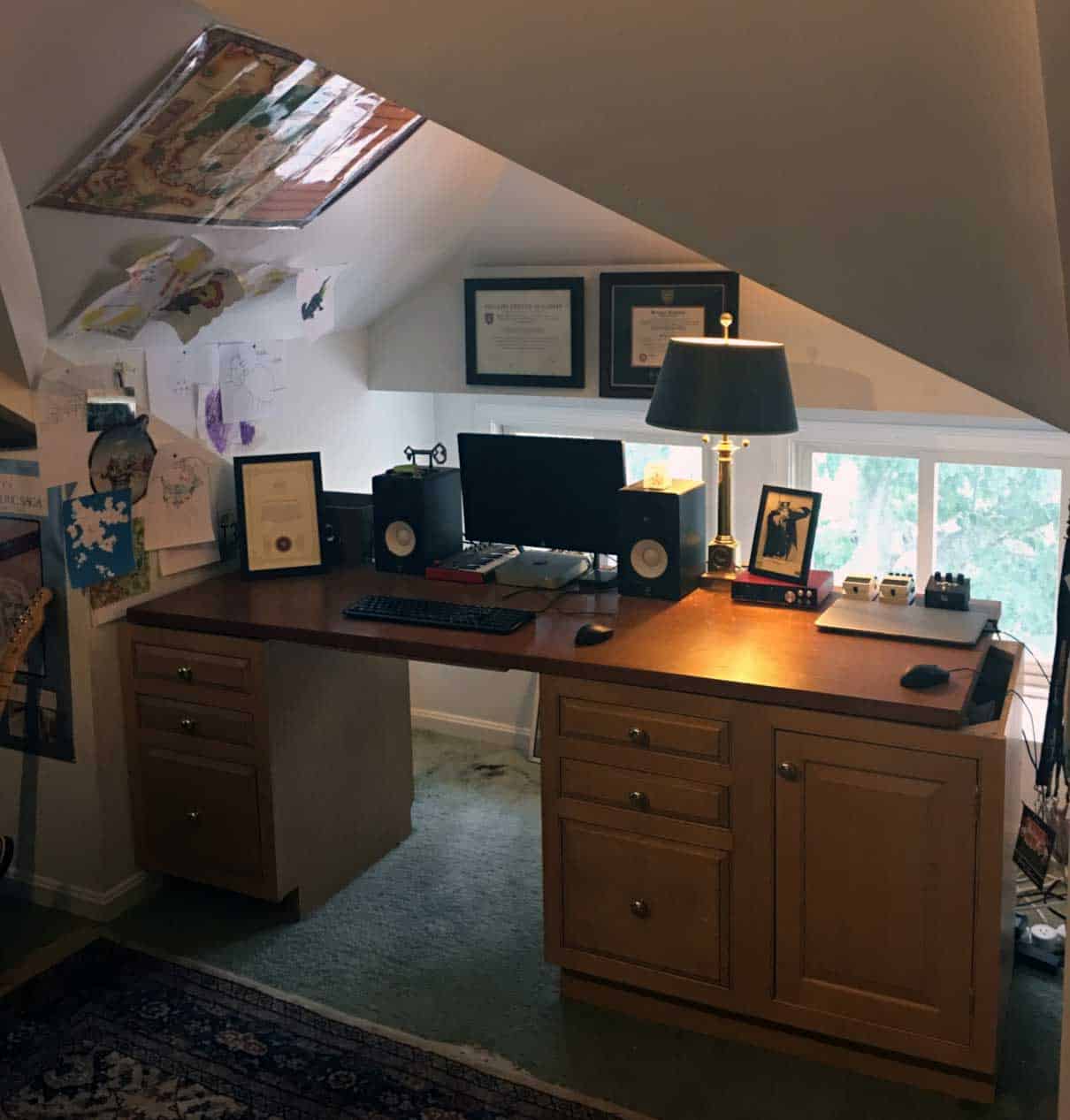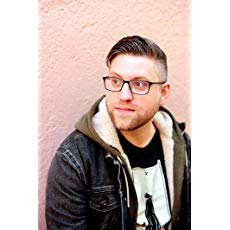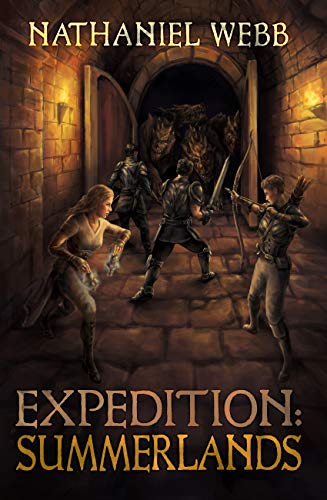Nathaniel Webb, aka Nat20, is an author, musician, and game designer from Portland, Maine. His writing includes the novels Expedition: Summerlands with Level Up publishing and The Days of Guns and Roses, various short stories and novellas, and adventures and supplements for the tabletop RPGs Shadow of the Demon Lord and Godless. As a lead guitarist, he has toured and recorded with numerous acts including Grammy-nominated singers Beth Hart and Jana Mashonee and Colombian pop star Marre.
When did you first start writing fiction?
I first wanted to be a writer when I was in middle school, so about fourteen thousand years ago. I took a detour through music for maybe a decade, then once I’d gotten married, found a real job, had a kid, and generally couldn’t go out touring anymore I turned back to fiction for my creative outlet. I’ve been writing seriously for about three years now.
What kind of books do you enjoy reading? Paper or eBook?
I definitely prefer paper books: the feel, the smell, the look of a full bookshelf. As long as you have adequate light, paper is the best technology for reading, hands down. I do have a Kindle, though, and I love it for two reasons: the backlight and Kindle Unlimited.
What’s your favorite under-appreciated novel?
I don’t know if they’re under-appreciated, exactly, but I think the Myth books by Robert Asprin don’t get enough love anymore. The series started in 1978, but a lot of the core concepts are familiar to LitRPG readers: the hero is a bumbling apprentice wizard who accidentally gains a demon companion and slowly, over the course of like a dozen novels, works his way up to being a competent spellcaster in charge of a group of adventurers for hire. (He also gets to hop through a bunch of different dimensions, which all have different rules.) I love anything where the characters really grow and change, rather than just having a bunch of interchangeable adventures, which is of course one of the great things about LitRPG!
Of your books, which is your personal favorite? Why?
Well, I probably ought to say Expedition: Summerlands! It’s my first foray into GameLit, which is exciting in and of itself, but it’s also very personal to me. The narrator is a science nerd who’s more interested in examining plant life than fighting monsters. She’s also camera shy, which makes it tough for her to succeed in the Summerlands, where you’re expected to be streaming your adventures and selling yourself all hours of the day. (Fellow indie authors will know this feel!) The themes of the novel–corporate takeover of our society, religion as performance rather than moral compass, the no-privacy culture of social media–are constantly on my mind as I raise my son. I’m not sure I have any answers, but I enjoyed grappling with the questions.
You can make one LitRPG book (not your own) a movie. Which is it and why?
Hmm, how about SLIME: Call of Tuatha by Outspan Foster? I’ve loved low-level slimes ever since the first Dragon Warrior game on NES and it’s about time they got the 21st-century CGI treatment. Oh, or Eight-Bit Bastards by Joshua Mason would make a great cartoon. He also has the best covers and ads.
Try my AI Tabletop RPG generators...and an extensive library of content!
Do you believe in writer’s block?
Hell yes! The hardest part of being a writer is dealing with that blank white page staring you in the face.
Are you an outliner or pantser?
I am a hard, hard outliner. I plan everything out, usually down to the scene, and when I find myself without an outline to work from I tend to get stuck. (Every now and then I’ll put something into a novel outline like “They journey through the wilderness: 10,000 words” and this inevitably ends up being a time bomb set by my lazy past self that blows up in my face. Damn you, lazy past self!) With that said, there’s always room for surprises, especially since I generally don’t have a good idea of what new characters are like until I start writing them. I often have moments where the outline says “now Character X does this thing” but when I get there in the draft, either Character Y would be more interesting there or Character X decides to do something else entirely. These are my “OF COURSE” moments, as in, “OF COURSE he was actually working for the bad guy all along!” or “OF COURSE these two villains have a creepy, manipulative affair going on!”
What is your writing process like?
I work in a process I call the detail spiral. (This is distinct from the depressive spiral that usually happens when I’m stuck or get a rejection letter and only ends with me face down and unconscious in an empty Domino’s cheesy bread box.)
Basically, when I start a new book I begin with a sort of free association brainstorm. I just write down everything that comes into my head, from ideas for scenes and characters, to snippets of poems or song lyrics, to weird things my kid says. (In the last few weeks he’s told me about blood spiders, which drink your blood to grow larger, and said he dug up a treasure chest full of keys, which is like the best quest hook I’ve ever heard.) Everything goes in the notes; I’m basically trying to create an overall impression of the vibe of the book. (For example, my urban fantasy novel The Days of Guns and Roses started from the work of a 19th-century poet named Ernest Dowson, and I set out to capture his kind of melancholy decadent libertine attitude, but with space dragons.)
From there, I start pulling out the pieces I like best and hammering them into a very rough, big-picture outline. A lot gets changed or discarded (or saved for later use somewhere else) at this point, as I turn the mood into an actual story. Then I fill in the blanks of the overview with the details in what I call the fat outline, where I basically write out the entire story in synopsis form. Finally, I write the first actual draft from that. The first draft sticks to the fat outline more or less, but I keep notes about what’s not working as I go. (“Going too long without any danger,” “too many sequences with mysterious little children,” that kind of thing.) I go back and fix that stuff, and then it goes to an editor who makes me change everything anyway.
⚔️ Fantasy RPG Random Tables Books
Make life as a Gamemaster easier…
If you play Dungeons & Dragons, Pathfinder, or other fantasy RPGs, this
RPG random tables series
is packed with encounters, NPCs, treasure, and more. Available in eBook or print—either way, you’ll have a wealth of adventure ideas at your fingertips.
How many hours a day do you write?
I’m not a full-timer (yet!) so I aim for a minimum of an hour a day. If I can do more, I will, but between a day job and a young kid that little chunk of time spent in my imagination is pretty precious. I write about a thousand words an hour when I get going, so I can get through a first draft in a few months barring any unexpected disasters. I’d love to get to the point that I can write eight hours a day, five or six days a week. I’d put a lot more books out!
Share a photo of your workspace and tell us about it?
This is my happy place. I’m surrounded by books, games, and some music memorabilia that reminds me I used to be cool. I like having a lot of junk around me to spur my imagination when I’m feeling stuck. It’s a converted attic, which means it’s the warmest place in my house during the long, long, long Maine winters.

Who are some of your favorite authors of all time?
C.S. Forester, who wrote the Horatio Hornblower historical fiction novels, is probably the best adventure writer who ever lived. His prose is very straightforward, nothing fancy about it, but you can start reading on any page of any book and you’re just instantly sucked into the story. He managed to make a canal trip to London into a nail-biting thriller. It’s really remarkable. I do love Tolkien, who I think knew exactly what he was doing with all those historical tangents and wasn’t always as serious as people accuse him of being. The moment in The Hobbit where Smaug basically says to Bilbo, “Hey, let’s say you steal all my gold, how are you going to carry it? Got a wheelbarrow, champ?” is just the perfect send-up of heroic fantasy. I’m not ashamed to admit I stole blatantly from that whole sequence in The Days of Guns and Roses. Lev Grossman elevated urban fantasy with the Magicians trilogy, which really struck a chord with me when I first read it (my old band even had a song called “The Magicians.”) Lois McMaster Bujold writes the best characters in sci-fi, who don’t just reset after each adventure. George MacDonald Fraser was the undisputed master of making you love a totally horrible protagonist (Harry Flashman from the Flashman Papers series).
Where do you get your ideas?
Everywhere. Current events, other books and movies, random things I see while driving to work… I have a long background in music, so I include a lot of musical easter eggs in my writing, but sometimes entire characters and plotlines come from snippets of song lyrics. The trick is writing all the ideas down before I forget them. I keep long lists of random notes on my phone, as well as a list of weird or interesting character names that pop into my head. Then I look back once a month or so after I’ve forgotten it all, and go “Hey, that’s kinda neat!” Here’s an example: I’m pretty sure Expedition: Summerlands started because I saw half a slogan on the side of an oil truck or something, and my brain filled it in with those words. The phrase made me think of a modern special forces team breaching the portal into a faerie realm. Then I was watching the first Dungeons & Dragons Stream of Many Eyes event in 2018, which made me think about adventure games and streaming, and it all got jumbled together into this idea of a game company controlling the entrance to a real fantasy world.

What are your thoughts on how VR will affect the future of humanity?
Maybe I’m a romantic, but I have a hope that VR will help us understand each other better. Right now, technology is very distancing. You can sit behind a keyboard and say stuff to people online that you’d never say in real life, and we can train soldiers to use drones to kill real people like they’re playing a video game. Once VR gets to the point we all dream of of being indistinguishable from reality, we’ll be back to interacting face-to-face in a way, which–hopefully–will bring us full circle and humanize the people outside our daily lives. Imagine being able to see if you have what it takes to survive as a hunter in the Kalahari, or if your history class about the London Blitz involved spending a night huddled in a bomb shelter. Way better than just reading about it!
If all else fails, we can all just go full holodeck addiction and leave each other alone as drones deliver our nutrient pellets.
What kind of research do you do, and how long do you spend researching before beginning a book?
I mostly research on the fly, though there’s usually a period where I read about the things that originally inspired the book, trawling for ideas. Mostly, stuff just comes up as it comes up. Wikipedia is really a godsend for writers; I can’t imagine doing this back when you had to pop down to the local library and hope for the best. For example, when writing Expedition: Summerlands I suddenly found that I needed to know how Viking longhouses were constructed. Google was there for me.
First video game memory?
When I was five, my older brother got a Nintendo Entertainment System, the set that came with the original Super Mario Bros. Then my dad blew our minds by getting us another whole game with it: ExciteBike. I can’t describe how many hours we spent in Design Mode making the most ridiculous tracks we could and crashing our way around them. There was also an incredible sense of wonder to discovering the Warp Zone at the end of level 1-2, as though we’d really stumbled into something secret and magical.
Then there was the time that I was so excited to play with my friend Mark’s R.O.B. that I refused to take a bathroom break and ended up peeing my pants, but we don’t tell that story.
What can fans expect from you next?
I’m currently halfway through the third book in my Veil of Worlds urban fantasy series which starts with The Days of Guns and Roses. The new one is a sort of puzzle thriller/treasure hunt, like The Da Vinci Code with magic and swords, inspired by a book called Metamagical Themas by the scientist Douglas Hoftstadter. After that, I’m contracted to write a non-fiction book about the prog rock band Marillion, but I’ve done most of the research already so that should go pretty quickly.
As far as GameLit and LitRPG, it’ll depend on the response to Expedition: Summerlands. I have about a million and one DND ideas for stories set in the Summerlands, and I’m really hopeful that readers will love noob adventurers Emma, Cass, Noah and Magpie (aka Hearthammer) as much I do. I’d be thrilled to get a series going! I do have about a dozen other LitRPG concepts on the back burner, too–one way or another I’ll be sticking around…
Anything else you would like to add?
Thank you so much for the interview!













